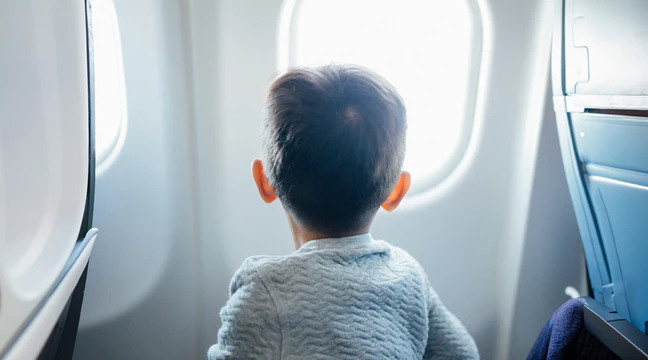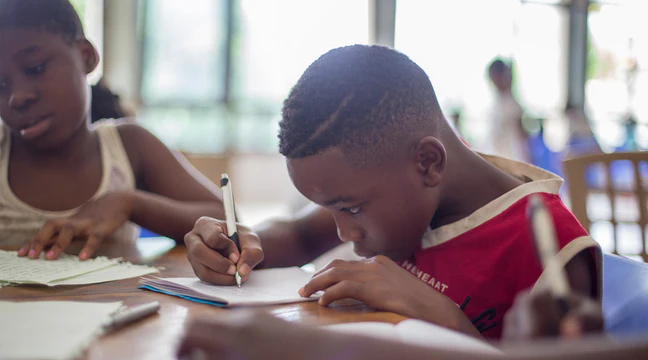Key takeaways
- There are lots of different reasons children might be distracted in the classroom or when studying at home
- Some of the major distractions include cellphones, visual distractions and environmental noise
- Children may be distracted due to sleep deprivation, ADHD and anxiety, among other reasons
Whether it’s the lure of constantly pinging messages on a smartphone, a constantly rumbling belly, or other people talking, there are distractions everywhere. That can be a problem for kids both at school and at home, as distractions can easily prevent children from focusing on their school work.
The first step to helping children become less distracted is understanding what’s causing the distractions in the first place. Here’s everything you need to know about the top distractions for children – and how to combat them.

Common distractions for children
Every child – just like every adult – is different. Some get more easily distracted than others, and different things can be distracting for different children. But there are some common distractions that seem to affect kids more than others.
Phones and digital devices
Just like for adults, this is a big one. While smartphones and laptops definitely have their place in education – making it easier to do research, for one – they can also be immensely distracting in a classroom environment.
They offer instant access to social media platforms and games, and the constant notifications can be too tempting to ignore. That’s because social media is literally designed to give us little waves of dopamine (otherwise known as the feel good hormone) every time someone likes a post or we get a notification.
It means that we can all waste hours every day scrolling through our smartphones – and kids are no different. In fact, one 2021 study by the Italian Journal of Pediatrics found that 66.4% of children in Italy spend four or more hours per day on their phones.
Those four hours inevitably overlap with time they’re in school, or time they should be studying at home.
There’s no denying: cellphones and other digital devices are one of the biggest examples of distractions for kids at school and home. But they’re not the only ones.
Background noise
Whether it’s other students talking in class, the hum of the ventilation system, or the television playing in the background when studying at home, some children can be incredibly distracted by background noise.
At school, some pupils can find it difficult to hear, understand and act upon the teacher’s instructions when there’s noise in the classroom and they may find it difficult to focus on their work.
Visual distractions
Similarly, some children can be distracted by visual stimuli. This can be a particular distraction in a classroom setting, where there’s a lot going on like people walking past the window or colorful posters on the wall.
These visual distractions may capture the attention of some students, making it hard for them to focus on the teacher or on the work in front of them. If their working environment is too cluttered, it can be difficult for some children to get in the right frame of mind to work.
Causes of distractions
There are lots of different reasons why some children seem to be more easily distracted than others, but some of the most common reasons include:
ADHD
Children with attention deficit hyperactivity disorder (ADHD) may have more difficulty concentrating. There are two types of ADHD: inattentive and hyperactive or impulsive. People with inattentive ADHD may have a short attention span, get easily distracted, have difficulty following or carrying out instructions, and may appear to be forgetful.
Those with hyperactive or impulsive ADHD may be unable to sit still and be constantly fidgeting. They also often find it difficult to concentrate on tasks.
Often, people with both types of ADHD can find it tricky to filter out irrelevant stimuli, which means they get easily distracted. So if there are lots of posters and colorful displays on the wall and groups of other children talking, for example, a child with ADHD may be highly distracted.
Additionally, people with ADHD can also become easily distracted or tune out when they’re doing a task that’s boring or too repetitive, so certain types of lessons may simply cause a child to switch off.
It’s not an unwillingness to learn that means children with ADHD are distracted at home or school. Rather, it’s simply the way their brains are wired.
Anxiety
Another common reason kids get distracted at school or home is anxiety. If you thought that anxiety was an issue that only affects adults, then think again – there are around 5.8 million children aged 3-17 in the United States who have been diagnosed with the condition.
Anxiety can have a significant impact on a child’s ability to concentrate. They might be preoccupied with things that are worrying them, or perhaps they are having intrusive thoughts, which distract them from the task at hand.
Anxiety often goes hand-in-hand with a range of different symptoms which can look like other conditions such as ADHD. A child with anxiety may be restless and fidgety, or they may ask the same questions over and over again because they’re having trouble interpreting information or instructions. Anxiety can even manifest as tantrums or disruptive behavior in class.
Sleep deprivation
Just as with adults, not getting enough sleep can cause kids to be easily distracted. They might have a harder time staying focused and engaged in class, memory function can be impaired, and even if they can focus on the task at hand, they may produce poorer work.
And sleep deprivation among children might be more prevalent than you thought. For kids aged 6-12, it’s recommended that they get 9-11 hours of sleep each night, and for teenagers, it’s 8-10 hours per night. But research has shown that as many as 25% of younger children suffer from poor sleep, while 57% of middle school kids and 72% of high school children get less than the recommended amount of sleep for their age.
For some children and teenagers, sleep simply isn’t a priority. They might be busy with other activities, or staying up late scrolling through their cellphone. Either way, it means they don’t get enough sleep and suffer and school the next day.
For teenagers, it may be down to their body clock. As children become teenagers, their body clocks shift so that they feel tired later in the evening. That’s problematic when school starts early in the morning, meaning that they may stay up late because they don’t feel tired, but be forced to get up earlier than they naturally want to – resulting in them feeling tired and distracted during the day.
Help kids find their focus
Whether you’re a teacher wondering how to limit distractions in the classroom, or a parent looking for ways to help your child with focus issues, there are lots of ways you can help. Understanding the root cause of their distractions is key – and once you know that, you can figure out how to offer them support to suit their specific needs, whether at home or at school.

Top Tips for Flying with Children: Essential Advice for Stress-Free Travel
Discover expert tips for flying with kids and ensure stress-free travel. Get essential advice for a smooth journey here.

Study Tips for School Children: Skills and Techniques for Effective Learning
Unlock effective study techniques for children with expert advice. Create a distraction-free study space, design a ...

Addressing noise disturbances: tips & laws
Learn how to address noise disturbances with practical tips and understand the laws that protect your peace. Essentia...













